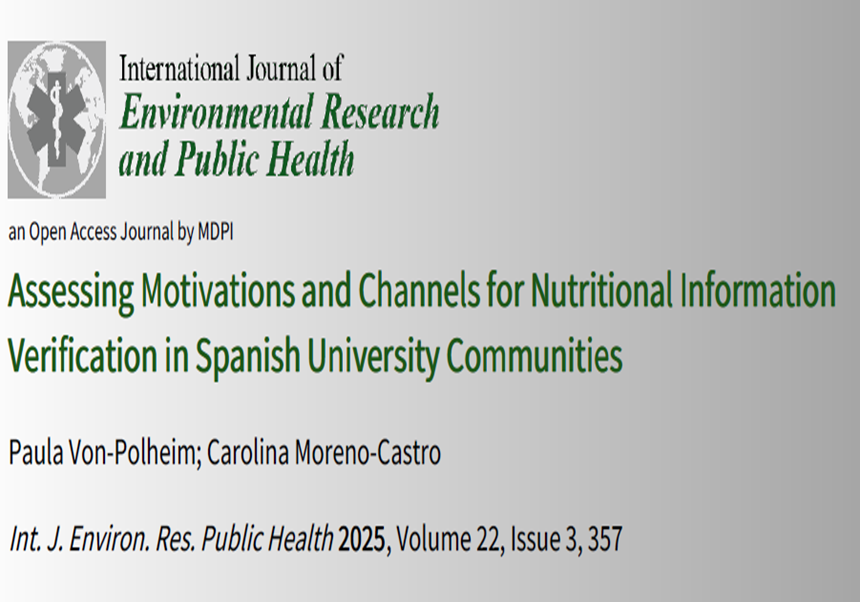
We share our latest publication in the International Journal of Environmental Research and Public Health, conducted by researchers Paula von Polheim and Dr. Carolina Moreno Castro, Full Professor of Journalism at the Universitat de València.
From the ScienceFlows research group, we have carried out a pilot study to analyze how university communities in Spain access and verify nutritional information, evaluating the main channels they use and the motivations behind their interest in this type of content.
Context and Methodology of the Study
The study was conducted in three Spanish universities: the Universidad Complutense de Madrid, the Universitat de València, and the Universidad de Málaga. The research was based on a brief questionnaire completed by 124 participants, including students, faculty, and administrative staff from these institutions.
The questionnaire included multiple-choice questions and an open-ended question to assess participants’ interest in nutritional topics and the methods they use to verify the information they consume. The data obtained were analyzed using the statistical software R, allowing us to identify key patterns in the verification practices of nutritional information within university communities.
Key Findings
The study’s results highlight that personal interest in nutrition is a determining factor in the decision to verify nutritional information. Participants with a high interest in nutrition were more likely to fact-check the information they encountered in social networks. Among those with low interest in nutritional topics, only 19 percent verified the information they consumed, whereas this percentage rose to 56 percent among participants with a high interest in nutrition.
Social media has been identified as a widely used channel for accessing nutritional information. So, platforms such as Instagram, TikTok, and YouTube are frequently consulted, yet they do not always provide data based on scientific evidence. The study found that while general media sources were the most cited for verification purposes, with 61 percent of participants using them, Facebook was the only platform where 100 percent of its users verified the information they found.
Additionally, the study has underscored the need to strengthen digital literacy within the university environment. Access to high-quality information and the ability to assess its reliability are key factors in making informed dietary decisions. Education in critical thinking and source verification is essential to mitigating the impact of nutritional misinformation.
Conclusions and Applications of the Study
The findings of this study can contribute to the development of awareness campaigns targeted at university communities to improve the quality of available nutritional information. Likewise, this research provides a solid foundation for future studies on the effects of nutritional misinformation in different population groups.
It is essential to promote access to reliable and scientific sources within the university environment and reinforce the role of media and social networks in disseminating evidence-based information about nutrition.
Funding and Acknowledgments
This research is part of the project “Study of Food Trends Through the Communicative Ecosystem” (ESMODA_ECO: RTI2018-099663-B-I00), funded by the MCIN/AEI/10.13039/501100011033 and the European Regional Development Fund (FEDER) “A Way of Making Europe”.
The study was also supported by the UNESCO Chair at the Universitat de València for Education for Development, Global Citizenship, and Awareness-Raising Actions during the 2021-2022 academic year.
Additionally, Paula von Polheim, the corresponding author, is a beneficiary of the University Teacher Training Program (FPU), funded by the Ministry of Science and Innovation of the Government of Spain (FPU2020-06223).
We would like to extend special thanks to the editors of the special issue Evolving Role of Social Media in Health Communication, Dr. Jorge Vázquez-Herrero from the Universidade de Santiago de Compostela and Dr. Rita Araújo from the Universidade do Minho, for coordinating this special issue. We also express our gratitude to all those who have supported this study and to everyone who participated in the research.
The full article is available at the following link: Assessing Motivations and Channels for Nutritional Information Verification in Spanish University Communities.









